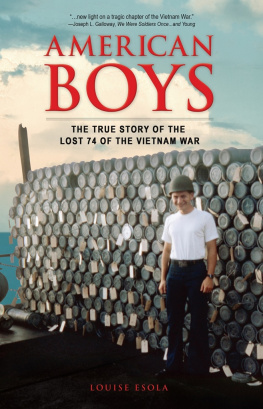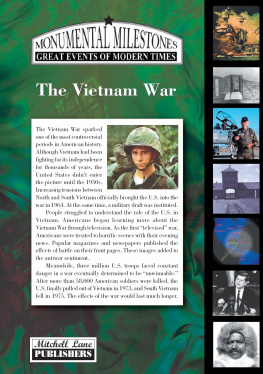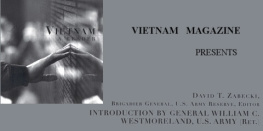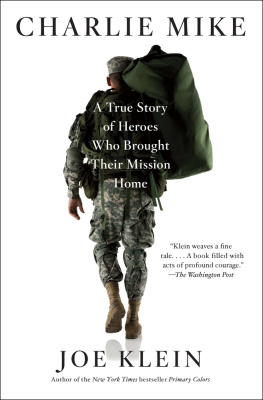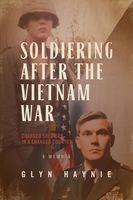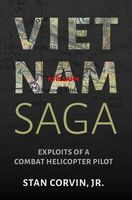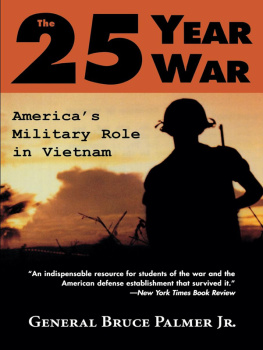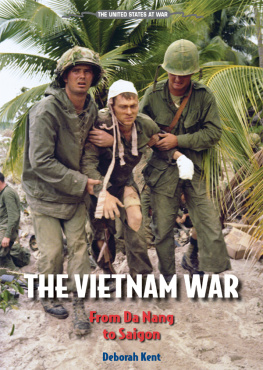In praise of American Boys
Louise Esola has shed new light on a tragic chapter of the Vietnam War. She has dug deeply into an accident at sea that took the lives of 74 young American sailors and has told their stories brilliantly! American Boys is worth your attention.
Joseph L. Galloway, Bronze Star recipient, Vietnam War combat journalist, and co-author of We Were Soldiers Once...and Young
Louise Esola has done a remarkable job of research in putting together this forgotten story of 74 young men who lost their lives on the USS Frank E. Evans during the Vietnam War. Ms. Esola, writing with conviction and compassion, does a long-neglected service to the memories of those killed in the line of duty. As a Vietnam War veteran myself, I salute Louise Esola and all those who have given their time and energy to keep alive the memories of the fallen.
Bestselling author and Vietnam veteran Nelson DeMille
With Louise Esolas powerful storytelling, American Boys uncovers a lost chapter of history full of grace and determination. A compelling read.
Gregory A. Freeman, bestselling author of Sailors to the End: The Deadly Fire on the USS Forrestal and the Heroes Who Fought It
With stellar reporting and strong writing, Louise Esola has rescued a largely forgotten incident of the Vietnam War: the sinking of the destroyer Frank E. Evans in 1969. American Boys traces the sailors from hometowns across America to their service aboard the ill-fated ship, giving the sailors the respect that their country has denied them. American Boys could easily become a classic story of men and war.
Tony Perry, Los Angeles Times
American Boys is that rare offering, and deserves its own commendation as a piece of powerful research into a segment of Vietnam history that many have tried to bury over the decades...one that deserves to not be forgotten.
Midwest Book Review
This is the story of one of the greateststill unresolved tragedies of the Vietnam War, one the U.S. Navy has pretended had nothing to do with it. American Boys explores the realities of Vietnam naval operations and, in evocative prose and stunning detail, it reports the sinking of the American destroyer Frank E. Evans, along with the decades-long struggle of survivors and families to get the Navy to acknowledge the truth of the matter. This book should be read and those Evans sailors commemorated.
John Prados, author of Vietnam: The History of an Unwinnable War, 1945-1975
Louise Esolas finely-wrought account of a Vietnam-era disaster at sea and its unending impact on the drowned sailors loved ones will echo in your mind long after youve put it down. This beautiful, heart-breaking book should be required reading at the Pentagon and the White House.
Jack Cheevers, author of Act of War: Lyndon Johnson, North Korea, and the Capture of the Spy Ship Pueblo.
American Boys is an important story, beautifully told. Long after you finish this book, you will remember the men of the USS Frank E. Evans , and understand why the fight to include the names of its 74 lost crew members continues.
Kristen Graham, Pulitzer prize-winning journalist with the Philadelphia Inquirer
American Boys
The True Story of the
Lost 74 of the Vietnam War
Louise Esola
Copyright 2014 by Louise Esola
Pennway Books
Temecula, California 92591
All rights reserved. No part of this publication may be reproduced, stored in a retrieval system, or transmitted, in any form or by any means, electronic, mechanical, photocopying, recording, or otherwise, without the written prior permission of the author.
ISBN: 978-0-9960574-2-4
About the cover
Before he deployed for Vietnam 19-year-old Danny Clute bought a camera to document his adventures with the United States Navy. In May 1969 his ship, the USS Frank E. Evans, sat off the coast of Vietnam firing thousands of shells to support troops on the ground. Later that month Danny left the film in Subic Bay, Philippines to be developed. On June 3, 1969 he was killed. Kodak Eastman Company tracked down the Clute family in San Jose, California to give them Dannys slides. That, some letters, and a telegram were all that was left.
This book is dedicated to my children
Salvatore and Santiago,
who taught me the kind of love that made this possible.
To my husband David,
who supported me every step of the way.
And to those whose lives were forever changed that day,
lest we forget.
The definition of a modern approach to war is the
acknowledgement of individual lives lost.
Maya Lin
would it help
the nightmares
I hear our ship breaking up
people calling for help
and they have people in the water
cant get to them
tried
help one
he was hit
steam
I caught his arms
I stayed with his skin
took him to sick bay but that was gone
people hanging from their dead
people calling for on the part that sank
no life jackets
just people walking around in shock
people in the water dying
this goes on 24/7/365 days a year
Chester Moneaux,
USS Frank E. Evans survivor
Delcambre, Louisiana, 2013
PROLOGUE
NAMES
November 1982
I n a city of white stone buildings and marble statues of great men long gone, they made an incision in the earth. From the fresh-laid grass rose a place to communicate with the dead. The leaves had turned gold, and there was a slight chill in the air. At dusk, as those in three-button suits who often decided the fate of the nation made for home under a purpling sky, workers polished the black granite, tracing the letters with their fingers. They, like the others, were taken aback by the immensity of it all: My God, the price in chiseled typeface. A terrible folly set forever in stone. Nearby, a long procession of monotone syllables echoed within the National Cathedral, like the reading at a holy day service: John ... Robert... Dale... James . Each one a story.
The somber homecoming parade had begun.
A nn Armstrong Dailey was one of many on the way to Washington National Airport that second week in November. The nations capital seemed even busier than usual. Election day had just passed, and Thanksgiving was still to come, yet the hotels were booked solid. The incomers were less official, less touristyno briefcases, no boxes of Kodak film. Some wore ragged U.S. Army fatigues, medals over denim, embroidered patches that told their stories. Some had beards and long hair. They looked like theyd been to hell and backthey wore it on their faces. A few carried signs: Never Again and Never Forget. There were the old couples, too, the ones whose hair, and lives, had gone gray. They walked with canes, weighed down by grief. Brothers and sisters, much younger, pushed strollers, carried children on their shoulders, or dragged along teenagers, for whom this was all part of the legend, family lore, someone theyd once known but whose face they couldnt recall. These people, pouring into Washington that fall, had a bond. It was as if they were all drawn by the same ghostly bugle, a newspaperman had typed. Their eyes still welled up if you asked them about that timethe day the telegram came, the moment they held a hand for the last time, the day they lost their youth, the time when they knew everything that was would never be again. A line between then and now. A barrier hard and cold as stone.
Ann was there, looking for her youngest sibling, thinking of another.

